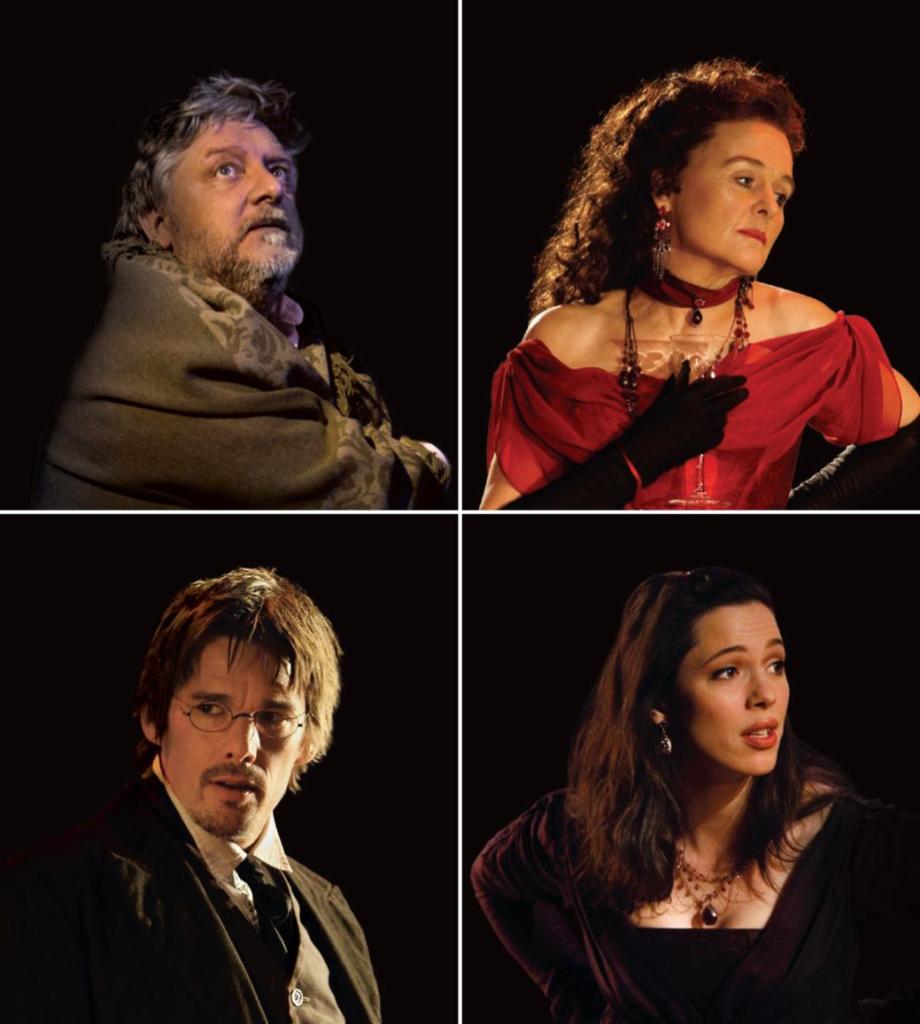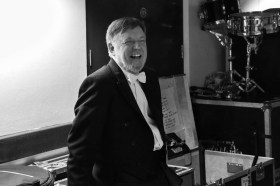It can be tough, in these mid crunch days, to sympathise with actors when they talk about how hard and frightening their work is. Ethan Hawke comments in the program notes for The Bridge Project:
What if it doesn’t work? What if it’s terrible and we have to take them around the world? I thought, that would be really awful! Now we’ve got to fly to Singapore, now to Madrid.
It’s a hard knock life when you’re condemned to spending three years on 6 of the world’s great plays; touring the world with film stars, stage greats and an Oscar winning director in a company made up half of British and half of American actors. The first season, now at the Old Vic, consists of The Winter’s Tale and The Cherry Orchard running in repertory.
Simon Russell Beale delivers a flawless performance as Leontes, King of Sicilia, in The Winter’s Tale. The audience is made complicit in the jealous King’s controlled descent into madness and tyranny over his Queen, Hermione, by clever lighting and Russell Beale’s masterful handling of Leontes’ increasingly tortured soliloquies. Sinead Cusack plays the ever faithful Paulina with just the right blend of shrewishness and compassion while Rebecca Hall is a moving, statuesque Hermione – no pun intended.
Sam Mendes’ Sicilia is an elegant, buttoned-up British sort of place and it is striking that, in such a well-ordered society, there is no effective check or balance upon Leontes’ crazed manipulation of his own legal system. It is only when the King resorts to blasphemy during the trial of Hermione that the lightning finally falls. When the action switches to Bohemia, in the third act, we find ourselves in a loose version of the Mid West complete with 4th of July parade. This choice allows Mendes to make full use of his dual nationality cast and none more so than Ethan Hawke as the rogue Autolycus.
Hawke turns the impenetrable peddler, with his dense dialogue full of obsolete words and images, into a quixotic Dylanesque minstrel with whom it is impossible not to sympathise: it is a remarkable rendering of an almost unplayable part. Tobias Segal does well with the clownish Young Shepherd and Morven Christie makes the most of Perdita, Leontes’ long lost daughter.
The return to Sicilia for the mass reconciliation is well-handled and, in keeping with the genre defying nature of the play, the audience remains in doubt until the very end over who will live happily ever after.
The Cherry Orchard takes place in the hopelessly mortgaged house and grounds of Ranevskaya, a widow of a certain and her own worst enemy, played with consummate skill and control by Sinead Cusack, who was so keen to be in the company that she wrote directly to Mendes. Ranevskaya and her peers cannot accept that they have been swallowed up both by history and their debts: they continue to spend money like water in the vain hope that ‘something will turn up’ until the very day that their precious orchard is purchased for development by their neighbour and would-be friend, the long-suffering Lopakhin (Simon Russell Beale).
The demands of a double bill – both are performed on Saturdays – have implications on the set designs. The Cherry Orchard is staged with little more than rehearsal furniture and, notwithstanding Tom Stoppard’s lively translation and some atmospheric lighting; at times the Old Vic stage seems on the empty side.
There is no real ‘lead’ character in the play, which makes it well suited to a strong ensemble. Rebecca Hall is excellent as the much put upon Varya, the sensible one of Ranevskaya’s three daughters. Driven to distraction by her family’s fecklessness, Hall’s Varya avoids taking refuge in querulous caricature and it is truly agonising when Lopakhin fails to propose to her. Richard Easton gives a moving, comic performance as the faithful Firs, left alone to die in the locked house after devoting his whole life to the family.
Mendes makes much of the dislocation between the generations in the play and the happy ending, such as it is, belongs to the youngest daughter, Anya (Morven Christie) and Trofimov, the eternal student (Ethan Hawke) who are united by their mutual desire to be up and doing. For them the end of the estate seems to promise opportunity and freedom from the fate of endlessly repeating the same old mistakes.
Nostalgia and the passage of time are the twin focus of this first Bridge season: as the audience gathers for both productions, the back wall of the stage is adorned with this quotation from Shakespeare’s Richard II: ‘O, call back yesterday, bid time return.’ Taken together or separately, these two plays are both excellent blends of some of the finest theatrical talent around.
Next season the company turns its attention to As You Like It and Three Sisters. No need to look for a day job just yet then Ethan – although the bar has been set pretty high…what if it doesn’t work next time around? Seems unlikely.





